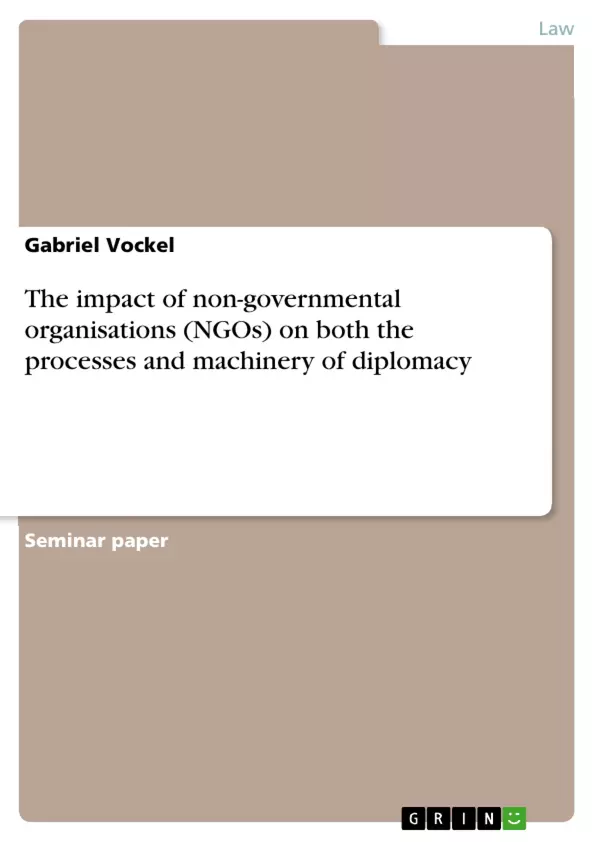While there are less than 200 governments in the global political system, there are approximately 60.000 major transnational companies (TNCs), about 10.000 singlecountry Non-Governmental Organisations (NGOs), 250 Intergovernmental Organizations (IGOs) and approximately 5.800 International Non-Governmental Organizations (INGOs). 1 Crucially, the advent of globalization that brought about democratisation of international relations, transnational links and diffusion of power has greatly effected the large proliferation of so-called non-governmental (transnational) actors. This paper will attempt to give insight into the specific role of (both national as well as international) NGOs as they touch the international diplomatic realm. The paper also seeks to analyse whether this makes a significant difference for both processes and machinery of diplomacy as the particular adopted patterns, techniques and institutions of interaction and communication in the infrastructure of the international arena. While doing so, we will necessarily touch some controversial views that might claim different truths regarding the same facts that we are about to discuss. Although this is not (yet) the place to engage any deeper conceptual theoretical analysis, it is worthwhile to note shortly, that the state-centric approach of the realist school of thought will inevitably assign other - less important - impacts to the activities of NGOs than the pluralistic understanding of our modern political system, and will prescribe other modi to deal with activities of civil society groups. The foundation for these different biases regarding the importance of NGOs undoubtedly lies within the different theoretical premises into which both poles of thinkers venture. While wishing to allow the reader to explore some evidence that we have gathered, we will leave any further conclusions for a later moment. [...]
Inhaltsverzeichnis (Table of Contents)
- Introduction
- The Analysis
- Effects of WTO approaches to NGOs
- Effects of WTO approaches to NGOs
- Deficits in and drawbacks of the WTO-NGO relationship
- Conclusion
Zielsetzung und Themenschwerpunkte (Objectives and Key Themes)
This paper investigates the impact of non-governmental organizations (NGOs) on the processes and machinery of diplomacy. It analyzes the role of national and international NGOs in the international diplomatic realm, exploring whether their activities make a significant difference in the patterns, techniques, and institutions of interaction and communication within the international arena. The paper specifically examines the relationship between NGOs and the World Trade Organization (WTO), highlighting approaches undertaken by both parties and analyzing the limitations and deficits in their interaction.
- The influence of NGOs on the processes and machinery of diplomacy
- The role of NGOs in the international diplomatic realm
- The relationship between NGOs and the World Trade Organization (WTO)
- The limitations and deficits in the WTO-NGO relationship
- The impact of globalization on the proliferation of non-governmental actors
Zusammenfassung der Kapitel (Chapter Summaries)
- Introduction: This chapter introduces the paper's focus on the impact of NGOs on diplomacy, highlighting the increasing role of non-governmental actors in the global political system. It acknowledges the controversy surrounding the importance of NGOs and provides a brief overview of contrasting theoretical perspectives on their role.
- The Analysis: This chapter delves into the relationship between NGOs and the WTO, specifically examining the approaches taken by both parties. It provides a definition of NGOs and discusses the evolution of their participation in WTO activities, highlighting the growing influence of NGOs in the organization's diplomatic processes.
Schlüsselwörter (Keywords)
The main keywords and focus topics of this work include non-governmental organizations (NGOs), diplomacy, international relations, the World Trade Organization (WTO), globalization, civil society, multi-lobbyist diplomacy, public-concerns-focused diplomacy, and the state-centric versus pluralistic perspectives on international politics.
Frequently Asked Questions
How do NGOs impact modern diplomacy?
NGOs influence the processes and machinery of diplomacy by introducing transnational links, diffusing power, and participating in international interactions outside state-centric models.
What is the difference between the realist and pluralistic views on NGOs?
The realist school views NGOs as less important than states, while the pluralistic perspective recognizes them as vital actors in a modern, globalized political system.
What is the specific relationship between NGOs and the WTO?
The paper analyzes how the WTO approaches NGOs, including the evolution of their participation and the deficits or drawbacks in their current relationship.
How has globalization affected the number of non-governmental actors?
Globalization has led to a large proliferation of non-governmental actors, including approximately 60,000 transnational companies and 10,000 national NGOs.
What is "multi-lobbyist diplomacy"?
It refers to a diplomatic environment where multiple non-state actors, such as NGOs, lobby international organizations to influence policy and public concerns.
- Quote paper
- Master of Arts in Diplomacy, Law and Global Change Gabriel Vockel (Author), 2005, The impact of non-governmental organisations (NGOs) on both the processes and machinery of diplomacy, Munich, GRIN Verlag, https://www.grin.com/document/66213



